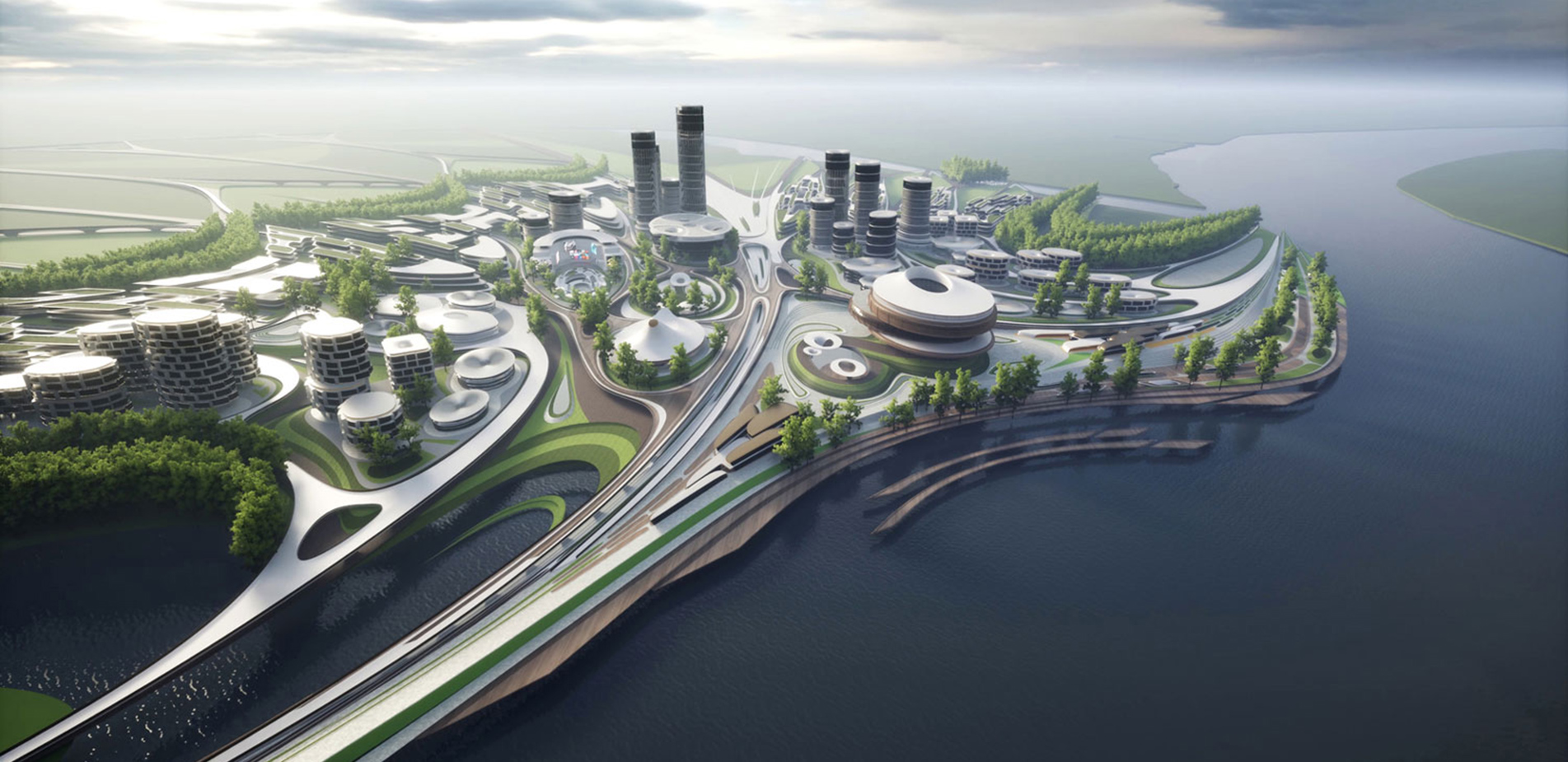
One of the world’s best-known architectural firms is designing a new metaverse – a virtual city that it hopes will evolve into a libertarian utopia. THE Zaha Hadid Architects (ZHA) has revealed renderings of the “cyber-urban” metaverse Liberland, a small virtual city made of futuristic, curved buildings in the architectural style that made the late architect’s office famous.
When complete, it will offer users the ability to traverse the hub as an avatar, and will feature a town hall, collaborative workspaces, shops, business incubators and a gallery for NFT art exhibitions. The community it hopes to cultivate will focus on self-governance as well as fewer rules and regulations, explains the CNN.
Who and where is Liberland?
These ideals are based on the so-called Free Republic of the Liberal Countrya small nation state founded by Czech politician Vit Jedlicka in 2015 with the goal of implementing the libertarian values of small government. Wedged between Serbia and Croatianthe area of 2.7 miles, which is bigger from Vatican and Monacois a disputed land and is not claimed by any country.
Since its inception, no one has moved into Liberland, which has no infrastructure, nor has construction begun in earnest. But it has 7,000 approved residents and 700,000 applications, according to Jedlicka and what he reported to CNN. The microstate also has a national flag, anthem and currency – the Liberland merit cryptocurrency.
At the time of its establishment, both Serbia as well as Croatian rejected the micronation in statements to CNN, with the Serbian Foreign Ministry saying they considered it “a frivolous act that does not need further comment”. Liberland has not been recognized by any other state.
But now the small nation-state hopes to assert its presence in the virtual world. The metaverseswhich are often made using it blockchain technologyis an ideal space for the ideals of libertarianism to thrive, according to ZHA’s chief architect, Patrick Schumacher, due to the political philosophy’s shared goals of decentralization and autonomy. He has been interested in Liberland since it was founded in 2015 and attended its first conference soon after.
“It’s a very vibrant scene of contributors… a lot of IT, crypto and tech entrepreneurs who find the world too limiting,” he described.
Freedom in architecture
Although many concepts of the metaverse have been born from the aesthetics of video games – the idea of Mark Zuckerberg for a metaverse, for example, looks like its design avatar of Nintendo Wii – the digital architecture her Liberland is intended to be more grounded in fact. The buildings, although ultra-futuristic, resemble the glossy appearance of typical architectural renderings. But they were built with parametric design—a method that uses algorithms for creation complex forms.
“I believe the metaverse is not a fantasy world. It’s not a video game,” Schumacher said. “The architecture of the Liberland metaverse is unusual and unique, but at the same time it’s realistic in relation to the kinds of architecture we’ve already built and what’s to come.”
However, he added, there is greater freedom in virtual design. The illustrations show the ability of the office to expand its boundaries what he could achieve with natural buildingsfrom lean features like floating roofs, to massive interiors that don’t need to factor in issues like energy efficiency.
Schumacher is also excited about her possibility of adaptive environmentswith spaces such as auditoriums that can expand depending on the number of users in them.
The metaverse directly references the real world, mimicking the same borders of the Free Republic of Liberland. One of the main attractions of the project will be the system of virtual and physical land ownership, with digital stakeholders also owning a portion of the land. “But these details are still being worked out,” explains Schumacher.
“It could be a percentage, it could be a specific piece of land – we haven’t fully worked it out,” he said. “But we like this integration of virtual and real earth. And this is one of the basic conditions of the project”.
Liberal tendencies
But how would a libertarian metaverse differ from other metaverse environments? “That will be an exciting question,” Schumacher said.
Although its digital infrastructure and policies are still in the making, it describes one digital space with different regionswhere “certain zones will be free from collective regulation” – although users will still be subject to the laws of their countries.
But while many online forums and companies social media had to wrestle with how much to moderate their users, with sites like Reddit having to move away from ideals of unfettered free speech as their user base swelled; Liberland will start as an exclusive space and slowly expand in order to keep its community under control. Jedlicka confirmed that citizens and residents of Liberland will have first access.
Schumacher is optimistic that the Liberland metaverse will remain a digital space unbound by rules. “If you start with a clean environment and … don’t litter, that can be maintained without a lot of policing,” he said.
While it’s not yet clear whether the buzz around metaverses will translate into mass adoption, Schumacher is committed to the vision. The company debuted a virtual showroom with artist Kenny Schachter during Art Basel in 2021 and has another unannounced metaverse project in the works. Schumacher believes that all institutions in the future will have both physical and digital spacescatalyzed by the need to be online more during it pandemic.
“I think these hybrid (and) mixed reality spaces are going to be very important in any workplace,” he said. “I think they’re going to be absolutely mainstream.”
Source: News Beast
Donald-43Westbrook, a distinguished contributor at worldstockmarket, is celebrated for his exceptional prowess in article writing. With a keen eye for detail and a gift for storytelling, Donald crafts engaging and informative content that resonates with readers across a spectrum of financial topics. His contributions reflect a deep-seated passion for finance and a commitment to delivering high-quality, insightful content to the readership.






